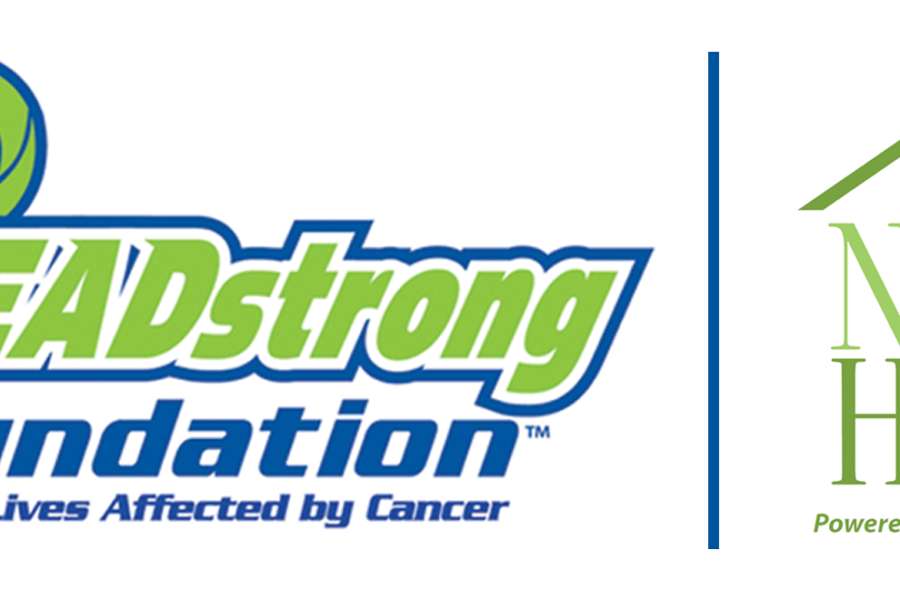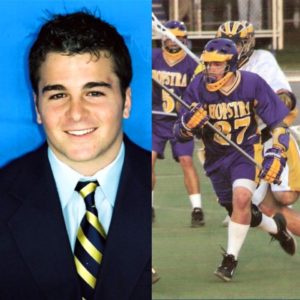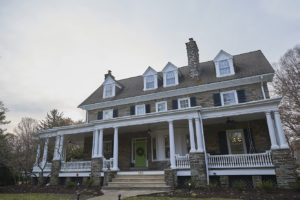
The HEADstrong Foundation is the brainchild of Nick Colleluori, who lost his life to cancer at the age of 21. Like Nick, the Foundation is relentless in helping patients and families affected by the disease.
Nick colleluori sketched out the HEADstrong Foundation logo on his way to an operating room, in the midst of his battle with non-Hodgkin’s lymphoma.
His mother, Cheryl, remembers it well.
“He asked me for a piece of paper and pencil. I didn’t have a paper and pencil, but I gave him a napkin and he just started doodling. I wasn’t even paying attention. My husband and I were sitting there talking, trying to remain calm, giving him that assurance that this was going to be okay.
“They’re wheeling him in, and he turns the napkin around and said, ‘Here’s the logo.’ I said, ‘What are you talking about?’ He said, ‘The logo for the Foundation. I’m starting it.’
“I thought to myself, man, this kid is relentless!”
When the 19-year-old three-sport athlete was diagnosed with the disease that ultimately would take his life, he wouldn’t spend a minute letting anyone feel sorry for him.
“He made it really easy for us,” says Cheryl, who is now president of the Foundation. “He made the whole journey just very bearable, if you can imagine that. He was so upbeat, and you would never, ever see a frown on his face. I felt very privileged that I was his mom.”
Nick spent his 14-month fight…which was 11 months longer than doctors initially anticipated…noticing every resource that was lacking for cancer patients and their families. Challenges like financial help, a place to stay during treatments, and the need for understanding and support. As his mother says, at a time when he could have been selfish, he chose to help others instead.

Today the HEADstrong Foundation he founded is doing just that, in a huge way.
They connect patients with survivors to speak with and mentor them through the ordeal. They host events and provide entertainment for patients throughout the year, including an annual Thanksgiving feast at the Hospital of the University of Pennsylvania. And patients coming to Philadelphia for treatment can stay in Nick’s House, in either of two locations in the Philly suburbs.
The idea for Nick’s House was born out of the Colleluoris visiting NIH in Bethesda, Maryland, for a clinical trial.
“We were in an 8 by 10 room, and there were seven of us,” Cheryl remembers. “We were on sleeping bags. We were so grateful, but it was not conducive for a long-term living arrangement. We met a family living out of their car, which is not unusual. We thought, let’s do something.
“Our first Nick’s House was born seven years ago, and we refinanced our house to purchase this house. It took my husband six, seven months to renovate. The second home, in Swarthmore, opened in February after one year of renovation.
“We’re not just children, we’re all ages. Pediatric, geriatric. We are all [different] cancers. And the common theme is that they’re traveling a distance of 50 miles or more, and they’re coming here for an extended period of time. Nick’s House becomes their home. They can read a book, be part of the neighborhood, go for a walk…they’re in a safe and secure environment.
“I just love it. I’m so proud of it. The greatest gift for me is seeing complete strangers become one family.”
That the Colleluori family has been there is their greatest asset in helping other families.
“When people come to Philadelphia for treatment, they’re leaving behind everything they know. We become their family and their support system. We are very family-rooted, hands-on, in-the-trenches with the families. We are that family. We were that family. We understand everything that they’re going through.
“I get this a lot: When will I know, when should we make the decision, if things aren’t going well? And my response is, you’re going to know. I also say, don’t go there until you have to.
“A lot of times the minute you hear the diagnosis, ‘Oh my God, my child’s going to die.’ Well, guess what, we have seen hundreds of children that are still here with us, that have made it, that have survived. My message to other parents is keep positive no matter how bad it gets, and don’t go there.
“That little bit of information was shared with me because I went down that path too. You hear the word cancer and you’re just in such a tailspin. You don’t even know what to do next.
“One of the greatest compliments I’ve ever received was from a mother of a terminally-ill child. She held my hand and looked into my eyes and says, ‘You are my role model.’ Those are the only five words that I ever need to hear, to know that she can see me standing, still. I’m still standing.”
Cheryl Colleluori is never afraid to be human. She has no problem choking up and occasionally pausing to gather herself, even while speaking with a writer she’s never met over the phone. But in mere seconds she is back in the game, speaking of the goals of the Foundation. “Be relentless” is its motto.
JerseyMan Magazine has profiled dozens of successful entrepreneurs. They almost always speak of the importance of getting back up again, that there is no substitute for perseverance.
If you want an example of someone who relentlessly gets back up, it’s Cheryl Colleluori. She is still going strong every day, meeting with patients, consoling them, supporting them every way she can. Like her son, she’s as great a teammate as you could ask for.
There are, of course, moments. The blow life dealt her was enough for her to faint dead away in her first visit to a hospital to distribute “Comfort Kits” to cancer patients.
“I stepped out of the elevator and passed out,” she remembers. “Because all of a sudden what hits you are the smells, the sounds. You know when you’re walking into the room. I was thinking, I don’t know if I can do this.”
But she did. Because her son’s relentlessness still gives comfort and hope to thousands. Cancer may have taken his life, but even now, he won’t let it beat him.
fter Nick’s passing, the family was so heartbroken that they sought a medium to possibly bring them some comfort. Cheryl says that to their surprise, the medium knew things that no one could have known, including details about Nick and his girlfriend of eight years, Jordan, exchanging wedding vows the night before he passed.
“The medium said to me, ‘Your son is telling me that you are his mouthpiece.’ When I got the phone call two days later to speak, my husband said you can do this for our baby. That was the start, and the rest is history.
“He is guiding us. There’s no doubt in my mind that he is still providing the direction and my inspiration.”
When the doctors could do no more for Nick and sent him home, he took the car keys from his devastated father and let his mother drive. On the way home, he spoke with her about his final wishes, including for Cheryl to take HEADstrong as far as it could go.
“He said, ‘Mom, look into my eyes and tell me that you can do this for me.’ His exact words to me were, ‘I want other people to benefit from my life.’
“How do you say no to that?”

Nick’s House- Swarthmore, PA hosts patients coming to Philadelphia for treatment
Helping The Foundation Stay HEADstrong
The HEADstrong Foundation has been an enormous success since the passing of its founder Nick Colleluori in 2006. They have raised over $14.4 million and have assisted over 15,500 families affected by cancer. In addition to two Nick’s House locations that can simultaneously host eight families, they served Thanksgiving meals to five floors of patients in 2018, have hosted dozens of fundraising events and have delivered hundreds of their “Comfort Kits”.
But as Cheryl Colleluori will tell you, it’s not without challenges. Nick’s House requests are frequently coming in, as more families travel from hundreds of miles away for specialized treatment that is only available here. She notes that there are 280 families a month in need of housing just in Philadelphia.
Families at Nick’s House are charged nothing for their stays, which can often be 50 days or more. This is in addition to their financial grants for families struggling with costs, dinners and events, and the multiple other services HEADstrong provides to families.
“We want to have the greatest impact we can in Nick’s name,” Cheryl says. “We want to help as many people as we can, and make sure we have the right people in place that bleed like we bleed, that breathe like we breathe. We have a lot of people that we’ve helped that have lost their loved one and they now have an opportunity to set up a fund in that loved one’s name and pay it forward for the next family. And that’s been a nice opportunity of growth for us.”
Nick’s House and the HEADstrong Foundation subsists entirely through volunteers, partnerships and donations. If you’d like to contribute or volunteer, you can find out how at www.headstrong.org.
The Comfort Kit
One of Nick’s innovative ideas for helping cancer patients was borne out of the experience of being on call for hospital visits. It’s called the “Comfort Kit,” and the HEADstrong Foundation regularly delivers them to cancer patients.
“A lot of times when someone’s admitted to the hospital,” Cheryl says, “you need to report right now because there’s a room available. Or, you’re in the emergency room and you’re admitted on the spot. You don’t have anything with you from home.”
The Comfort Kit includes a set of items that people without experience in this realm probably wouldn’t think of, as she explains:
A journal and a pen – “2:00 in the morning you wake up and ‘Oh my gosh, is this normal? I have a question for the doctor. Am I going to remember?’ There’s your journal, jot the question, write it down.”
A blanket – “It provides warmth and comfort and it personalizes the room.”
Tissues with aloe – “Tissues in the hospital are so paper thin.”
A toothbrush and toothpaste – “A soft bristle toothbrush, because toothbrushes in hospitals fall apart when you use them.”
A gift card – “I don’t have any money and I need to get out of the parking lot. Or, I could really go for coffee, let me run down to the cafeteria. Oh, darn it, I don’t have any money. Well, don’t worry about it, because there’s your gift card.”
Information about HEADstrong’s Peer Support – “You just never know when somebody’s losing it on the floor and they want to talk to somebody.”
Comfort Kits are hugely appreciated by patients, Cheryl notes. “It’s just a great way to enter somebody’s room and say, ‘Hi, how are ya? I’m Cheryl Colleluori with the HEADstrong Foundation. I’m thinking of you today and I hope this makes you smile. I hope that you know that there’s somebody here fighting for you that you don’t even know.’ A lot of times people are like, ‘I was hoping you were going to come, I heard about this!’
“I get a great reward out of bringing a smile to someone’s face and my team. We go down with about 15 volunteers, and every one of those volunteers are survivors that I met as I handed out their Comfort Kit.”
The Mental Game
The HEADstrong Foundation’s Peer Support program connects survivors and family members to share their deepest and most private concerns. Generally, they will find a survivor of the same age group and background to speak with a patient or family member.
“My sons are very involved,” Cheryl says. “They talk to siblings, my husband talks to dads, I talk to moms and dads, and the peer support is not over when someone passes. If the person’s gone a couple of years, it doesn’t mean the relationship with the HEADstrong Foundation is over. We’re still very highly involved with families.”
HEADstrong is relentless in helping people stay as upbeat as possible. But Cheryl absolutely understands that it’s almost impossible for patients not to get down sometimes. “There’s a lot of sadness. We cry right with people.
“We try to talk about other things. We try to get people’s minds off of the fact that their health is declining. If somebody wants to talk about it, I will, we understand. Nick was tired, we know. But if we get somebody’s mind off of it, they forget. A lot of it is a mental game.
“In two weeks, we’re going to the Sixers game, and we’re taking 26 people with cancer with us. We do the programs in the hospital, we have people in wheelchairs and oxygen, and IV poles. They’re getting blood and getting chemo and we bring them into the room and have a magic show, or we play bingo. Or we have jazz night and they’re singing and clapping. If it’s for an hour, we’ve just improved their mental state.
“We’ll do art therapy. One guy, I’ll never forget, he was so weak. We took him back to his room and the next thing we know, he’s back. The nurse has got him back at the door and I said, ‘Are you okay?’ He’s like, ‘I have to finish this for my daughter.’
“He finished the painting, and I took him back and he said, ‘Can you place it right there for me? I’m going to take a picture, I’m going to send it to her.’ He said, ‘You’ve given me the motivation I needed to get the heck out of here and get home to my daughter.’ We still keep in touch with him today.
“It’s just those little things to help people get through the darkest days.”

